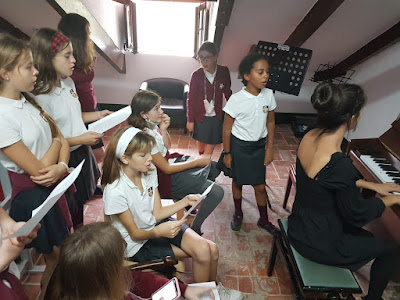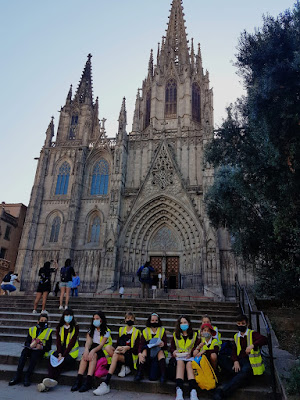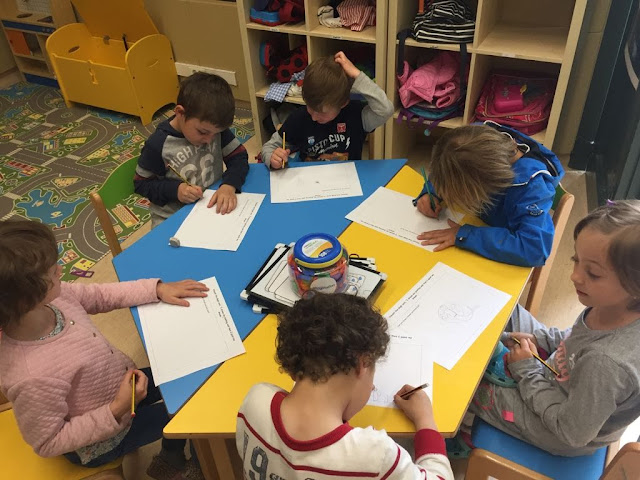International Rural School
Learning through experiences in the natural environment
dijous, 22 de desembre del 2022
dijous, 15 de juliol del 2021
diumenge, 3 de gener del 2021
diumenge, 29 de novembre del 2020
Ara ve Nadal
Desembre ha arribat i el fred ha començat! El final d’any és temps d’avaluació. És precís fer una mirada enrere a tots aquests mesos perquè segur que en podem aprendre alguna cosa. El 2020 ha estat un any molt complicat, no dic res de nou. L’escola va haver de tancar des de mitjans de març fins a principis de juny sense avís previ. L’equip docent va reaccionar molt ràpid i, sense dilació, van començar les classes per zoom al dia següent. I els alumnes, quin progrés tan espectacular van fer! Alguns no havien utilitzat mai el google classroom, però de seguida en van aprendre i, amb l’ajuda dels pares, van ser capaços de continuar el seu aprenentatge.
Un altre repte d’aquest any ha estat l’adequació de la
nova escola a Can Ribó. Rehabilitar l’edifici, fer la teulada nova, canviar la
instal·lació elèctrica, clavegueram nou... Es diu ràpid, però l’estiu va ser un
compte enrere per a tots els operaris per tal de guanyar temps al temps. Al
setembre havíem de començar i havia d’estar tot enllestit.
Aquest nou curs ha començat amb molta il·lusió. Hem donat
la benvinguda a alguns nens i professors nous que de seguida s’han adaptat al
tarannà de l’escola. L’avaluació del primer trimestre ha estat molt positiva, tots
han fet un gran esforç. Alguns nens que no entenien l’anglès ara ja comencen a
seguir les classes.
El Nadal és un temps de vacances en el qual la implicació
familiar pot ajudar a aprendre d’una
altra manera: activitats artístiques i lúdiques amb els nens, visualització de
pel·lícules en anglès, documentals, xerrades didàctiques pares i fills... No
sabem si podrem sortir massa a visitar museus o firetes de pessebres, però
segur que aquestes setmanes serviran per gaudir d’un temps en família i d’un
descans ben merescut.
Bon Nadal i Bon Any 2021!
dissabte, 10 d’octubre del 2020
Nou curs escolar
diumenge, 22 de desembre del 2019
divendres, 20 de desembre del 2019
diumenge, 10 de novembre del 2019
Show must go on
diumenge, 13 d’octubre del 2019
Programa Salut i escola
diumenge, 15 de setembre del 2019
Un nou curs escolar
dissabte, 1 de juny del 2019
Teach babies to read?
dissabte, 27 d’abril del 2019
Writing is learned by writing
Tell me and I will forget,
Show me and I will remember,
Let me do it and I will learn it.
Bibliography
Freinet, C. (1974). Consejos a los maestros jóvenes. Hospitalet: Editorial Laia.
Marina, J. A. (2008). La magia de escribir. Barcelona: De Bolsillo.
Rodari, G. (2012). Gramática de la fantasia. Barcelona: Planeta.
diumenge, 24 de març del 2019
Neural networks
Over the past month, I have been so impressed with how the children have advanced in their learning processes in the acquisition of knowledge and skills. Children who did not have English knowledge and/or had never played a musical instrument or applied curricular concepts (such as multiplication tables, the periodic table etc.), after just a few months they were able to memorise multiple curricular data, acquire greater english language fluency and discover their inner musical talent. It is true, the brain is a dynamic organ that is in constant development; this is especially true for children, as children have twice as many synapses as adolescents or adults. However, the latest data from neuroscience also confirms that the brain is always capable of developing, even in old age (Pagan, 2019). What is presently clear, is that new experiences create new neural circuits. The greater number of stimuli in our environment, the more brain connections will be formed; thus increasing our capabilities (Jauset, 2009). I disagree with some “unschooler” families, who choose to allow the child to "naturally" develop educationally, without guidance. Additionally, studies have not reflected impoverished regions in the world that do not have egalitarian access to education. Perhaps, these children will be very prepared to survive in natural environments, but they may be cognitively malnourished and ill equipped to live in our present world.
I am impressed to read about the myriad of studies that suggest music stimulates and improves results in the areas of language and mathematics (Jauset, 2009) (Rosenkranz, 2007). Musical learning involves many parts of the cerebral cortex, which is why musicians, according to certain researchers, have greater synaptic plasticity than non-musicians (Spychiger, 1994). This same principle can be applied to other disciplines absent from many traditional schools: sports, art, and theater in example. Learning to perform any new activity regardless of age, generates new neuron connections brain function as a whole. It is essential to set new challenges and goals by overcoming oneself day by day, open to learning and new experiences but to ensure successful development in all areas. This ultimately prepares us for life and learning for the present and future.
Bibliography
Jauset, J. (2009). Música y neurociencia: la musicoterapia. Barcelona: UOC.
Pagan. (2019). La jornada de Oriente. Obtenido de http://www.lajornadadeoriente.com.mx/2006/09/28/puebla/c3pag11.php
Rosenkranz. (2007). Motocortical excitability and synaptic plasticity is enhanced in profesional musicians. Journal of Neuroscience, 5200-5206.
Spychiger. (1994). Music and cognitive achievement in children. Music Research Notes.
divendres, 22 de febrer del 2019
How to face the education of the future today
dimarts, 8 de gener del 2019
Center of Interest
Ovide Decroly was born at the end of 19th century. He is well a know pedagogue. Decroly has influenced the pedagogy around “Escola nova”. He believes that the purpose of the school is to help students be ready for the world, whatever the future holds. Education it is about allowing children to gain experiences, to learn to live in new and better ways, to take charge of their future, to shape it and deal with its challenges. Decroly refused traditional education, he proposed an education connected with the primary needs of the child and their natural interests. He promoted Center of Interest, promoting activities based on observation, small research, exploration of the environment, using the associations within the space, time, phenomena, objects, facts and people.
He give us some examples to implement in the school:
-We have to take the students to the forest, farms and fields around the school. Immersion in real nature as often as possible through the crops, breeding animals, botanic trips, zoological trips and so on.
-We have to show to the children the workshops around our area, letting them practise whenever it is possible different profession and crafts such as a carpentry, shoemaking, dressmaking, baking…
-We have to show the social rules of society, municipal organisation and practise them, visit the Mayor or the city council, we can also implement some of the rules in the class, given the students duties and responsibilities.
Decroly thinks that schools should work as a restaurant. The teacher should offer different meals to the students, having different quantities and a wide range of different ingredients to nurture the inquisitive desire to learn from the children. This is a good way to personalise education and follow the children’s interests.


















































